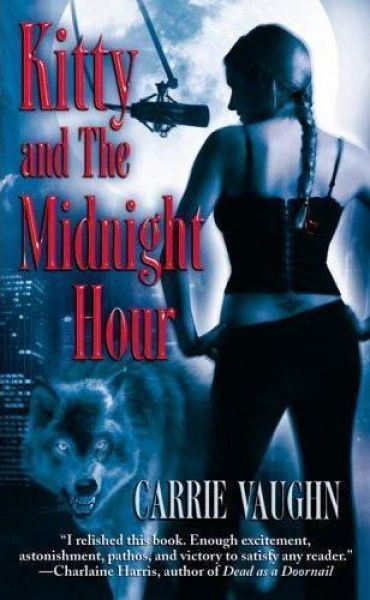I’ve always had a soft spot for radio
Kitty and the Midnight Hour (Kitty Norville, volume 1)
By Carrie Vaughn

6 Aug, 2015
0 comments
Even by 2005, when Carrie Vaughn’s [1] Kitty and the Midnight Hour was first published, I had read a great many urban fantasies/paranormal romances (courtesy of Andrew Wheeler at Bookspan), I had read enough of these to understand that although the Kitty Norville books share many of the surface features common to the genre, the series is more than a little different under the hood.
When we first meet her, Kitty Norville is a late-night radio DJ on Denver’s radio K‑NOB; she is obscure and seemingly fated to stay that way. This changes dramatically when she more or less by accident discovers a brand new niche for late-night call-in shows: the Midnight Hour becomes the show you call if you’re a werewolf, a vampire, or a vampire’s thrall, and you need to talk to someone about the unusual demands your condition imposes on you.
Kitty understands because Kitty is herself a werewolf.
The little people of Denver’s supernatural scene [2] like the Midnight Hour; it’s a place to share, a comfort. However, neither Arturo (who runs the local vampire scene) nor Carl (alpha male and packmaster of the local werewolves) are keen on Kitty’s new show. It’s harder to keep the existence of supernatural beings a secret when they’re chatting live on a radio show every night. Even if the mundanes think what they are listening to is a combination of hoax and nutters.
It doesn’t help Kitty’s relations with Carl and Arturo when the Midnight Hour gets nationally syndicated. It doesn’t even help her bank account. because she has to split her take from the radio show with Carl, so that he will allow her to continue airing her show; Kitty depends on her pack, and staying in the pack means keeping thuggish Carl and his bitchy partner Meg happy. Or at least not too unhappy.
Relations with the mundanes are also dicey. The Midnight Hour is well enough known that when Denver finds itself suffering an ongoing series of mauling deaths, maulings that look very much like the work of a wolf, Kitty’s name is right at the top of the list of people whom the local cops ask to assist them in their inquiries.
And then there’s the little matter of the contract killer who shows up to collect a bounty on Kitty in the middle of her show.…
~oOo~
In most of the urban fantasy/paranormal romance books, the supernaturals have their own legal system (which more frequently than you may expect involves a level of brutal violence the Campbells and MacDonalds would find a bit extreme). The mundanes may or may not be aware of this supernatural legal system, but there’s rarely anything they can do about it.
At first, that seems to be what’s going on in Denver. The vampires have their arrangements (which seem to be pretty much indistinguishable from the set up mean cool kids would create, if mean cool kids had their own night clubs). The werewolves are farther down the pecking order (something of a sore point for them), but they too have their own system of dealing with internal conflict.
Kitty does think the cops would be out of their depth if they had to handle a rogue werewolf, which justifies a more informal approach to the problem that the rogue presents. Given the kind of firepower American cops can bring to bear (even a decade ago), I think she’s wrong. Also, it’s pretty clear that the Denver cops, at least, frown on supernaturals killing each other; that’s just as illegal as it is for mundanes. The cops would bring charges against the rogue werewolf if they could get their hands on sufficient evidence. In fact, Kitty has to tread carefully not to get hauled in herself.
(I am sad to say that Kitty and Cormac the racist — specieist? — contract killer become pals. I really really detest the “my pal is a stone cold killer; how convenient!” trope in the mystery and mystery-adjacent genres and in Cormac’s case, he specializes in killing people just like Kitty. At least a later book establishes that it’s still illegal for him to kill defenseless people, even if he really really doesn’t like them.)
For that matter, the more we see of the inner workings of Kitty’s pack, the less it looks like a social arrangement driven by biological/paranormal inevitability and more it looks like an extremely dysfunctional gang run by two codependent abusers. In fact, Kitty’s traumatic conversion to werewolf happened right on the heels of an unrelated sexual assault. Carl, Meg, and company came along at just the wrong time and found in Kitty someone insecure enough to be co-opted into their pack.
The novel and the series that follow are about Kitty learning (or rediscovering) how to stand up for herself, rather than knuckling under to some sub-feudal social system. In fact, the plot of this book in particular is about the consequences of her increasing self-confidence, whether expressed in the form of the radio show or pushing back at Carl and Meg. In the process, Kitty doesn’t give up the basic values you would expect from a modern American woman. That makes this series unusual enough to stand out.
Kitty and the Midnight Hour, as well as other Carrie Vaughn novels, is available from Grand Central Publishing.
1: PSA: Do not under any circumstances allow yourself to be earwormed with the song “Polly Von” every time you see Vaughn’s name.
That would be as bad as being ear-wormed with the song “I Dreamed I Saw Joe Hill Last Night” every time you see the name of the author of Heart-Shaped Box.
2: Relax, I am not going to do some back-of-the-envelope calculations re how many vampires and werewolves Denver could support. But I did seriously think about the ecological issues.
